OpenSSH updated to version 9.9
All Render services now use OpenSSH version 9.9 to manage SSH connections. Services previously used version 8.9.
If you initiate SSH connections from your service, this upgrade includes one change that might affect those connections. From the OpenSSH release notes:
"SetEnv directives in ssh_config and sshd_config are now first-match-wins to match other directives. Previously if an environment variable was multiply specified the last set value would have been used."
If you use the SetEnv directive in your service's SSH configuration, make sure you don't set the same environment variable multiple times to avoid unexpected behavior.
Learn more about using SSH on Render in the documentation.
The Render CLI is now available in public beta
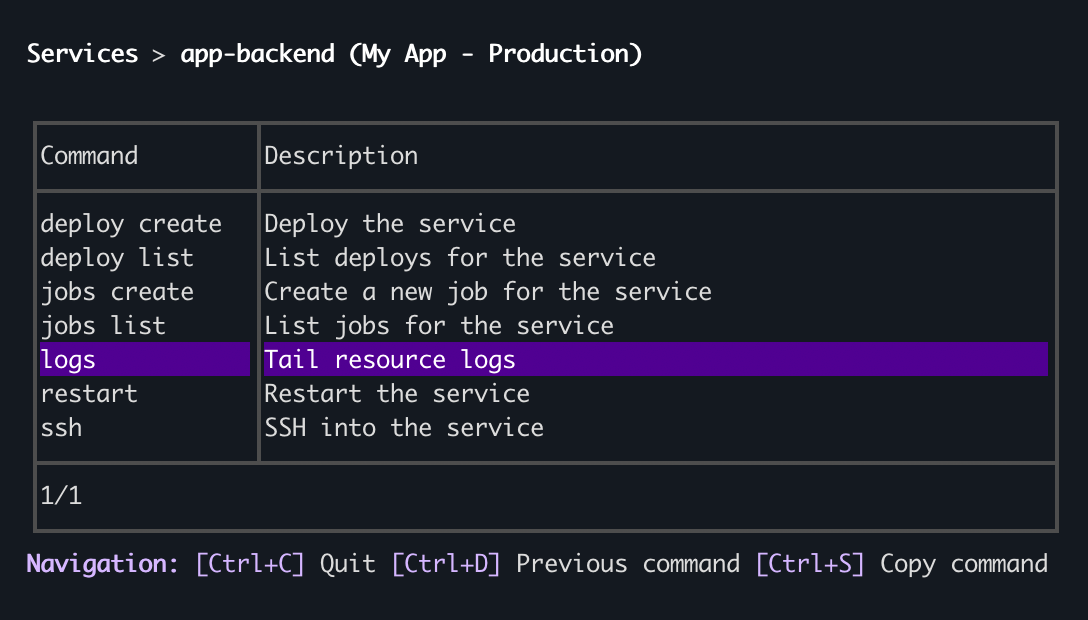
Now in public beta, the new Render CLI provides command-line support for common platform actions, including:
- Triggering service deploys, restarts, and one-off jobs
- Opening a psql session to your database
- Viewing and filtering live service logs
The CLI supports interactive menu-based navigation, along with a non-interactive mode for use in scripts and CI/CD.
AI chat now available in the Render documentation
The Render docs now provide AI-powered chat trained on our documentation content. Click Ask AI next to the search box:
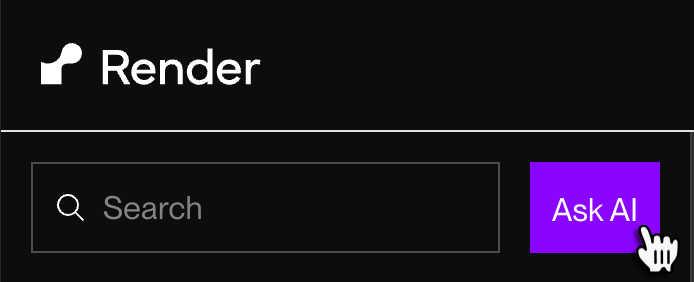
Use the chat to receive fast, focused answers to your questions about the platform, along with links to relevant articles:
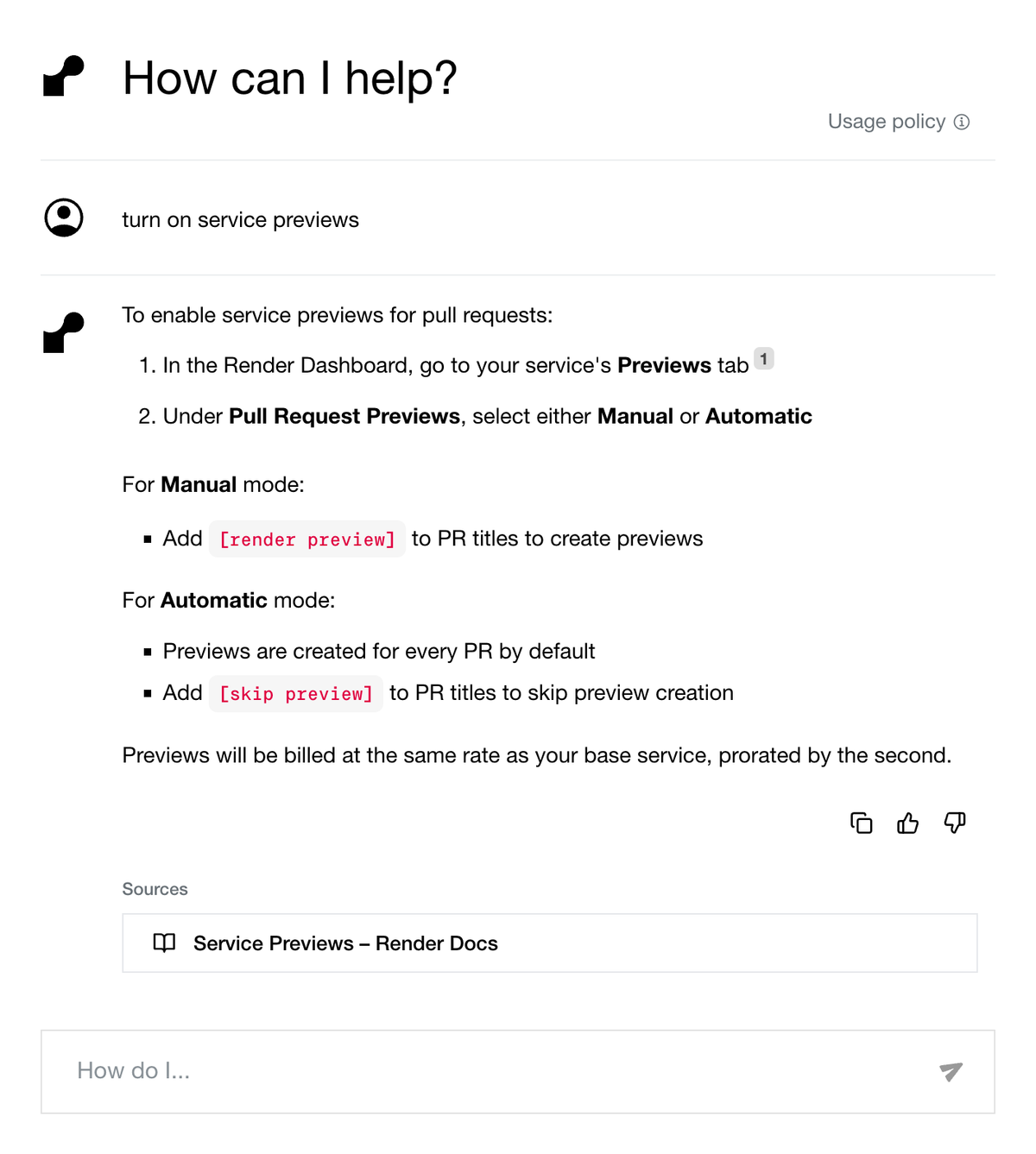
In-place PostgreSQL upgrades now generally available
In-place PostgreSQL upgrades are now generally available for all Render workspaces. This feature upgrades your database to the most recent major PostgreSQL version supported by Render (currently 16).
Upgrading your database requires downtime. Schedule upgrades accordingly.
Open the upgrade page for your database in the Render Dashboard by clicking the version number on its Info page:
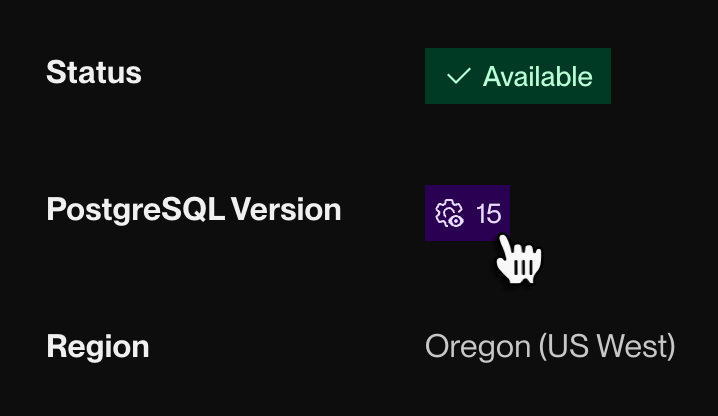
Learn more in the documentation.
PostgreSQL 12 moved to legacy support
Render has moved PostgreSQL version 12 to legacy support ahead of its end-of-life on November 14.
Starting today, you cannot create new managed PostgreSQL 12 databases in your workspace unless you already have one.
We strongly recommend upgrading any PostgreSQL 12 databases to an actively supported version to continue receiving important security updates. Render supports in-place upgrades to PostgreSQL 16 from any previous version.
Default Node.js version updated to 22.10.0
Newly created Node.js services now use Node.js 22.10.0 by default. You can always specify a different version.
Existing Node.js services keep their original default version to prevent breaking changes.
Default Python version updated to 3.11.10
Newly created Python services now use Python 3.11.10 by default. You can always specify a different version.
Existing Python services keep their original default version to prevent breaking changes.
In-place PostgreSQL upgrades now available in early access
Update: In-place PostgreSQL upgrades are now generally available.
Render now provides early access support for upgrading your PostgreSQL database's major version in-place. This upgrades your database to the most recent PostgreSQL version supported by Render (currently 16).
Upgrading your database requires downtime. Schedule upgrades accordingly.
Enable in-place upgrades from your Workspace Settings page in the Render Dashboard, under Early Access:
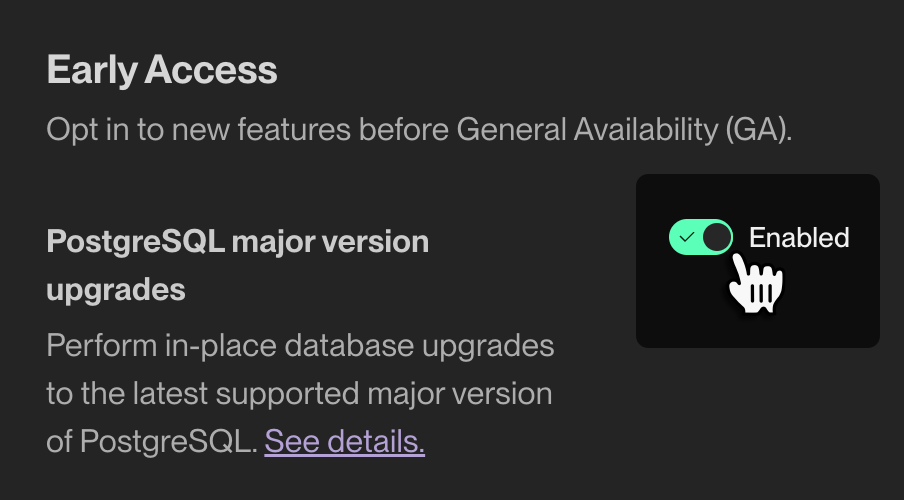
Then open the upgrade page for your database by clicking the version number on its Info page:

Learn more in the documentation.
Flexible PostgreSQL plans now available for all workspaces
Render's new flexible plans for Render PostgreSQL are now available for all workspaces. These plans enable you to set your database's storage separately from its RAM and CPU.
Starting today, every new database created on Render has a flexible plan. If you have a database on a legacy instance type, you can optionally move it to a flexible plan for improved customization and control.
Learn more in the documentation.
Enable maintenance mode to temporarily disable incoming service traffic
You can now enable maintenance mode for any paid web service in the Render Dashboard:
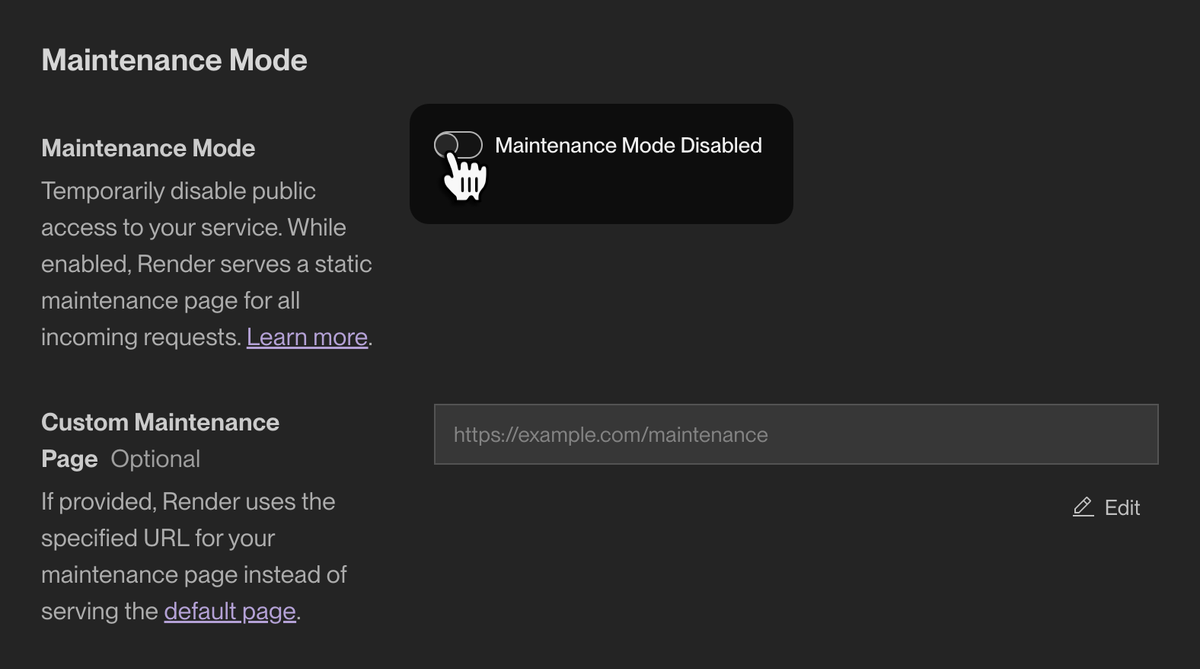
While in maintenance mode, a web service is not reachable from the public internet (but it remains up and running).
Enable maintenance mode to prevent incoming client requests while rolling out major changes to your infrastructure.
Learn more in the documentation.
Render accounts are now workspaces
All individual and team accounts on Render are now workspaces. This unified account model simplifies upgrading from an individual to a team. There are no changes to pricing.
Here's a summary of what's changed:
- Each individual account is now a free Hobby workspace with a single seat.
- Each team account is now a workspace with its existing plan, seats, and features.
- Hobby workspaces gain the ability to create one project with up to two environments.
- A newly created Hobby workspace can add a maximum of two total custom domains.
- This limit does not apply to individual accounts created before this date.
- The Team plan is now named Professional. Paid plans are otherwise unchanged.
- You can upgrade or downgrade your workspace's plan at any time.
For details about each workspace plan, see the pricing page.
Specify deploy behavior when modifying environment variables
When you update a service's environment variables in the Render Dashboard, you can now specify whether this triggers a new deploy.
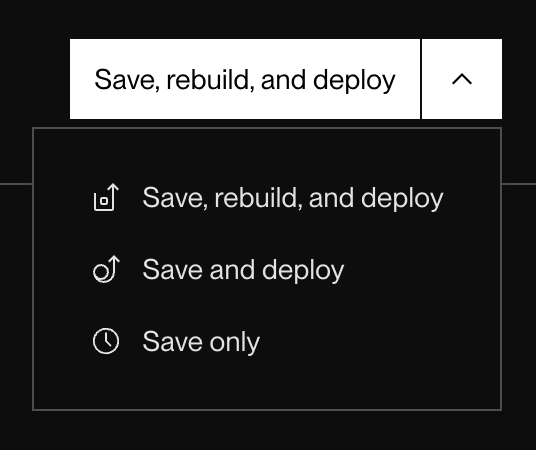
You can select from three options:
- Save, rebuild, and deploy: Render triggers a new build for your service and deploys it with the new environment variables.
- Save and deploy: Render redeploys your service's existing build with the new environment variables.
- Save only: Render saves the new environment variables without triggering a deploy. Your service will not use the new variables until its next deploy.
Learn more about environment variables in the documentation.
Pull request previews now create GitHub deploys
As part of creating a pull request preview, Render now creates a GitHub deploy on the associated pull request. This matches the behavior for preview environments.

Click View deployment to open the preview instance in your browser.
Before this change, Render instead added a comment with preview details to your pull request. Render continues to use comments for GitLab and Bitbucket repositories.
Learn more in the documentation.
Customize log streaming for individual services
Render teams with a configured log stream can now override their default log stream settings for individual services:
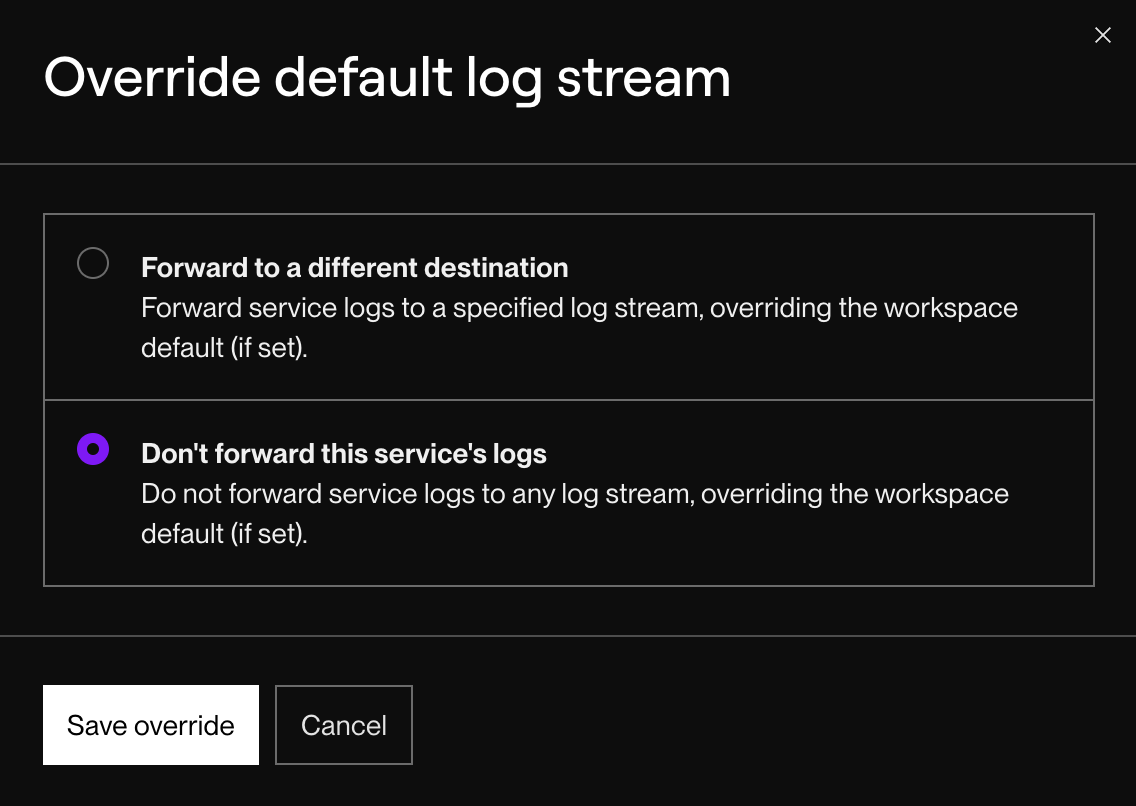
- All teams can disable log streaming for an individual service.
- Teams with an Organization plan or higher can stream an individual service's logs to a non-default destination.
Additionally, all accounts can now configure whether logs from preview instances (service previews and preview environments) are included in their log stream.
Learn more in the documentation.
Create preview instances only for specific pull requests
You can now opt to create preview instances only for particular pull requests that you specify. This new manual preview mode is provided alongside the original automatic mode, where Render creates a preview for every pull request by default:

In manual mode, you trigger a preview for a pull request by including the string [render preview] in the PR's title.
You can enable manual previews for any combination of pull request previews and preview environments. See the documentation for each:
Block private network traffic across environment boundaries
Teams on Render can now configure a project environment to block all private network traffic from entering or leaving that environment. This helps prevent your staging services from inadvertently accessing a production resource (or vice versa).
Toggle this setting from an environment's Settings page in the Render Dashboard:
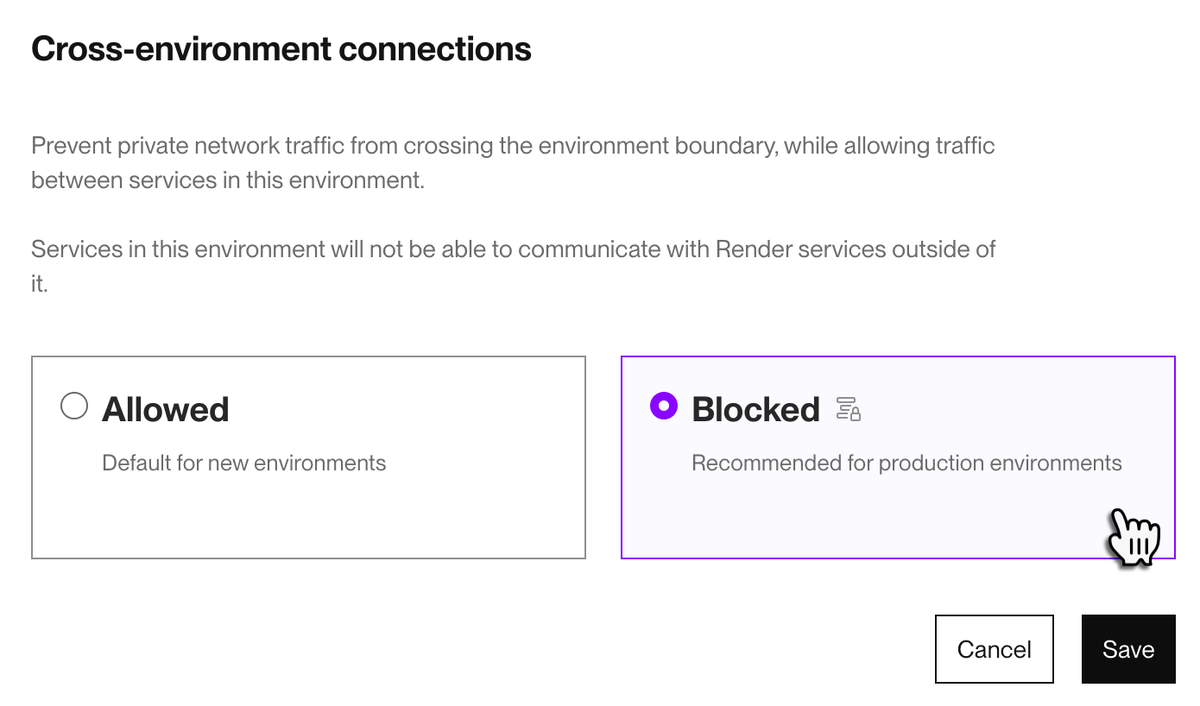
Learn more in the documentation.
Added restrictions and audit tracking for viewing secret values
Protected environments on Render now enforce the following additional restrictions:
- Only Admin team members can view the values of environment variables and secret files for resources in the environment.
- Only Admin team members can view connection URLs and passwords for PostgreSQL databases and Redis instances in the environment.
Additionally, Render audit logs track the viewing of these values for all of an organization's resources (not just resources in a protected environment).
Virginia region (US East) now generally available
Render's Virginia (US East) region has graduated from early access to general availability.
Select a service's region as part of the creation flow in the Render Dashboard:
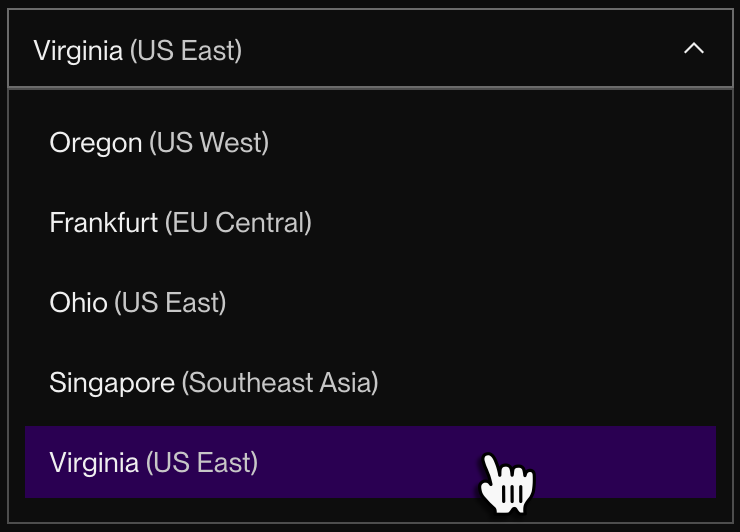
Render supports deploying services to the following regions:
- Oregon, USA
- Ohio, USA
- Virginia, USA
- Frankfurt, Germany
- Singapore
Added dark display theme to the Render Dashboard
The Render Dashboard now provides a dark display theme:
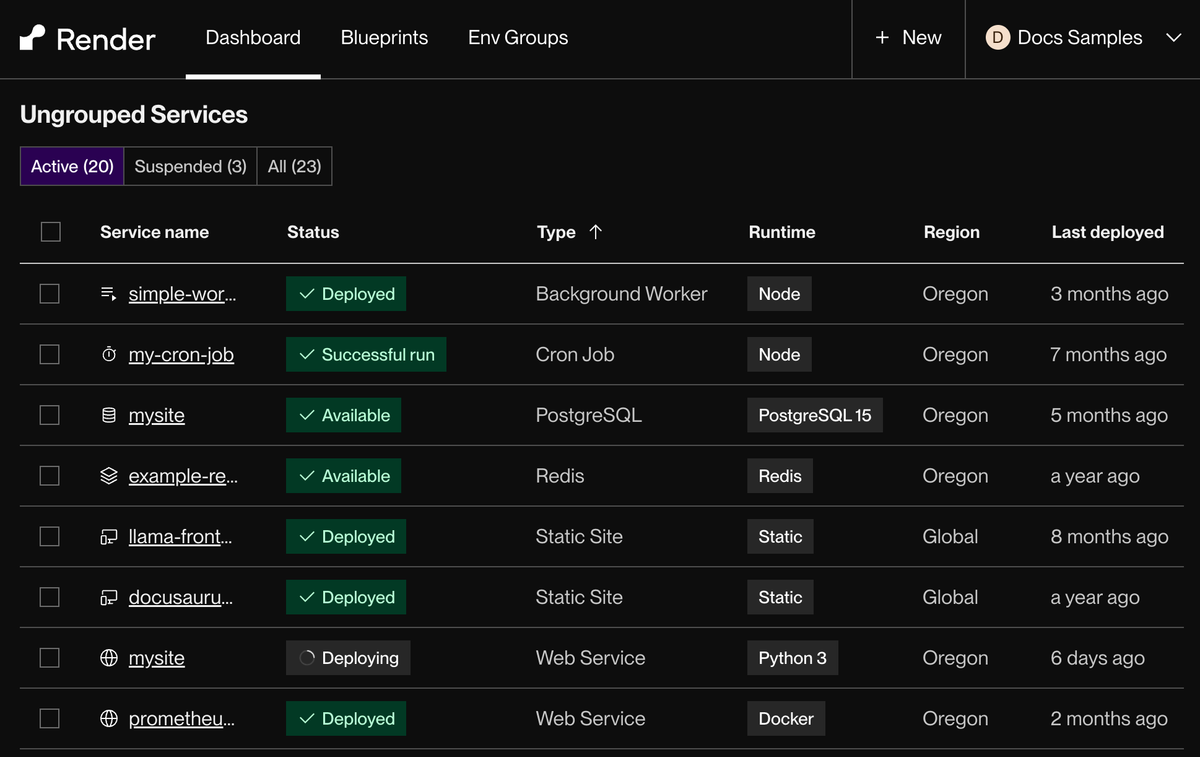
Additionally, you can toggle a high contrast mode to more prominently highlight certain interactive elements.
Quickly set your theme from the account menu in the top-right corner of the dashboard:
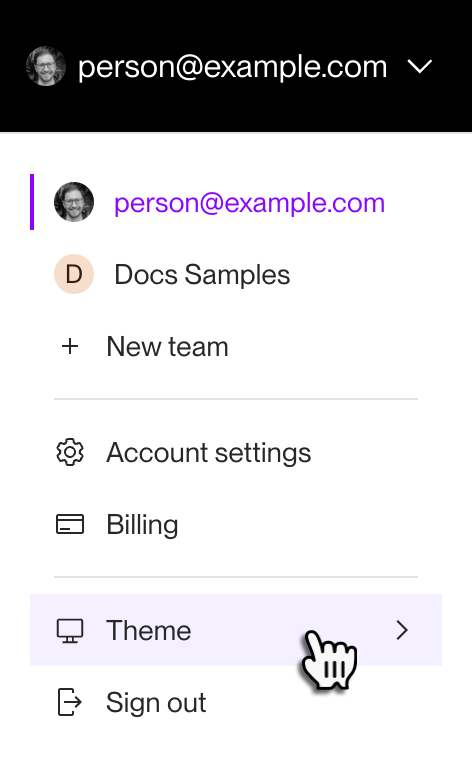
To also toggle high contrast, open your account settings and scroll down to the Theme section:
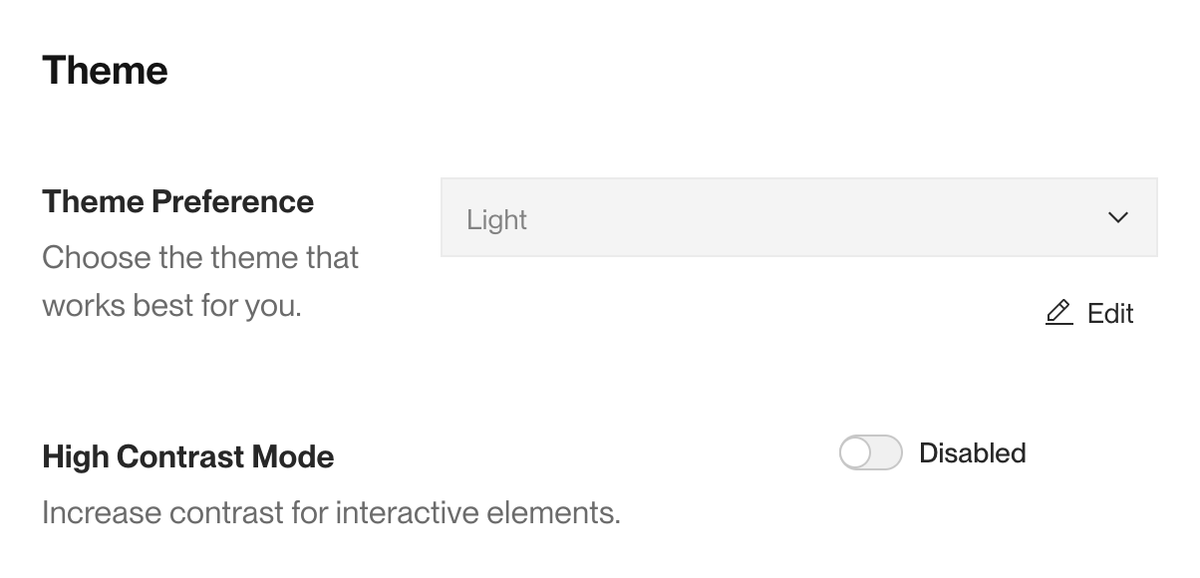
API endpoints for datastores, logs, environments, Blueprints, and more
The Render API has added over 50 new endpoints to support much more extensive integration with the Render platform.
Endpoints are now available for the following resources that were previously unsupported by the API:
- Datastores (PostgreSQL, Redis, and persistent disks)
- Service logs
- Environment groups
- Blueprints
- Projects and environments
- Notification settings
New endpoints are also available for certain resources that are already supported by the API, such as redirect/rewrite rules for static sites.
With these additions, the API supports almost all functionality available in the Render Dashboard. There are no breaking changes to existing API endpoints.
The OpenAPI spec for the Render API is available in JSON format at this URL. You can use this spec to create your own custom clients and other tooling.
Learn more in the API reference.
Redis instances now emit service logs
Redis instances now emit service logs. As with logs for other service types, Redis logs are available in the Render Dashboard and via any configured log stream.
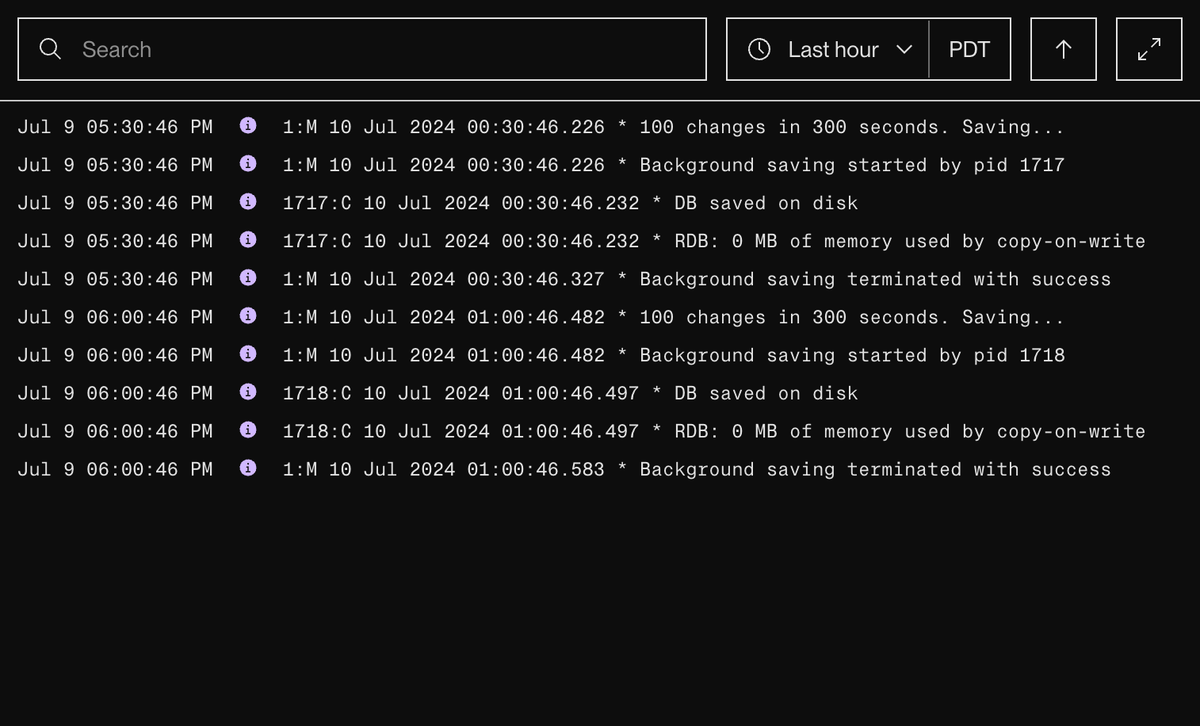
Learn more about logging in the documentation.
Default Node.js version updated to 20.15.1
Newly created Node.js services now use Node.js 20.15.1 by default. You can always specify a different version.
Existing Node.js services keep their original default version to prevent breaking changes.
Audit logs for Organization and Enterprise plans
Teams with an Organization or Enterprise plan can now export audit logs of material events that occurred in the account over a given time frame. This includes events related to:
- Team member management
- Project and environment management
- Service creation/deletion
Team admins can export audit log data in the Render Dashboard, from the Audit Logs section of the Team Settings page:
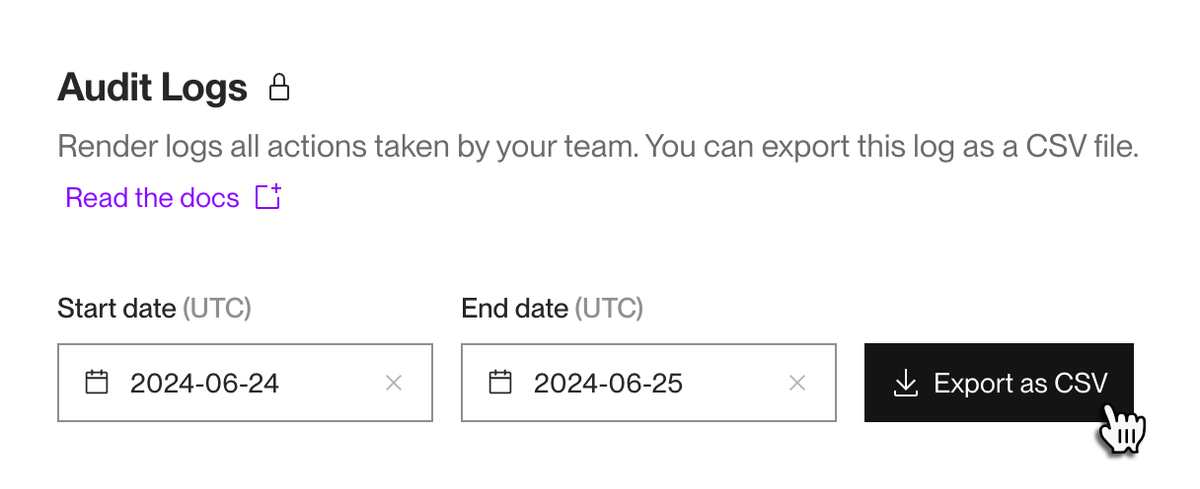
For a list of all audit log event types, see the documentation.
Note the following about data availability:
- For existing Organization and Enterprise accounts, audit log data is available starting from June 24, 2024.
- For a new Organization or Enterprise account, audit log data is available starting from the date of account creation.
- If you upgrade an account to Organization or Enterprise, audit log data is available starting from the date of the upgrade.
Learn more in the documentation.
Pull and deploy private images from Google Artifact Registry
You can now pull and deploy your private Docker images from Google Artifact Registry. Add your credentials in the Render Dashboard during service creation:
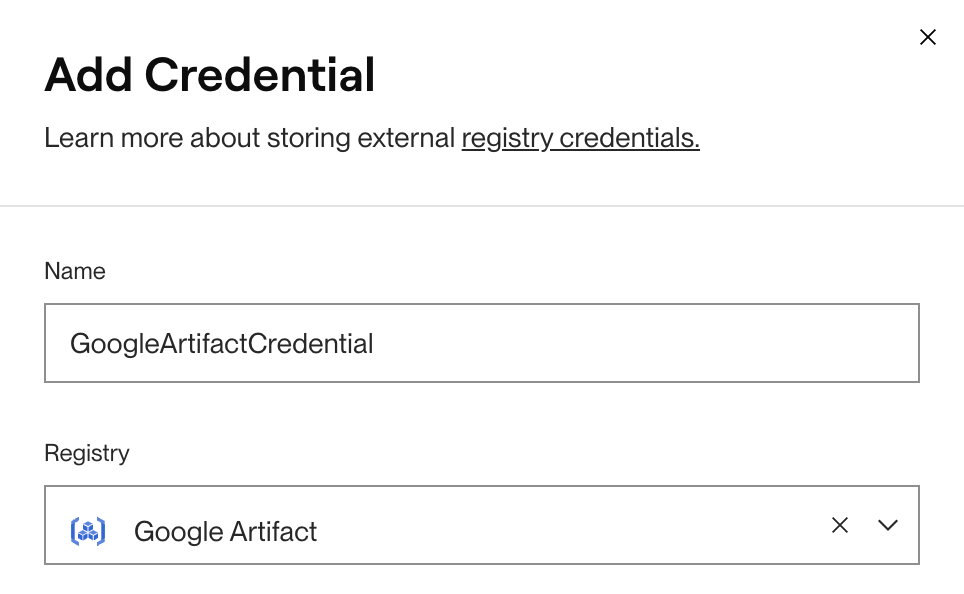
With this addition, Render now supports pulling private images from the following registries:
- Docker Hub
- GitHub Container Registry
- GitLab Container Registry
- Google Artifact Registry
Learn more in the documentation.
Quickly deploy PostgreSQL admin apps from the Render Dashboard
Render now provides simplified deployment for popular PostgreSQL admin apps in the Render Dashboard.
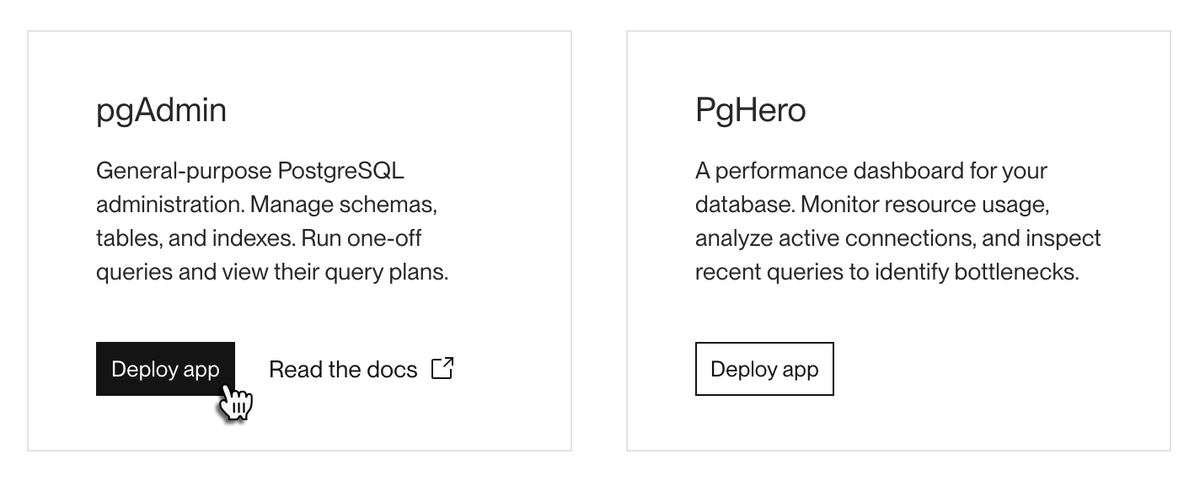
With a few clicks, you can deploy each app as a standalone web service that's automatically configured to connect to your database.
The following apps are currently supported:
- pgAdmin
- PgHero
Learn more in the documentation.
Official Render Terraform provider now available in early access
Render's official Terraform provider is now available in early access. You can use this provider to manage your Render services alongside other systems in your organization's infrastructure.
- The provider and its documentation are available in the Terraform Registry.
- Please submit any issues on GitHub.
Note that breaking changes might be introduced during the early access period. Any such changes will be noted in accompanying release notes.
Change an existing service's runtime via API or Blueprint
You can now change the native runtime for an existing service in any of the following ways:
- Make an HTTP call to the Render API’s Update service endpoint.
- Specify a new
runtimevia theserviceDetailsparameter you provide in your request.
- Specify a new
- If you’re managing your service with Render Blueprints, update the service’s
runtimefield in yourrender.yamlfile, then sync your Blueprint.
Changing a service's runtime in the Render Dashboard is not currently supported.
Learn more in the documentation.
Free PostgreSQL instances now expire after 30 days (previously 90)
As of 2024-05-20, newly created Free Render PostgreSQL databases expire after 30 days (previously 90 days). Free databases created prior to this date retain their original expiration date.
The following Free database policies remain unchanged:
- Each individual and team account is limited to one Free database at a time.
- After your Free database expires, you have an additional 14 days to upgrade it to a paid instance type before your data is deleted.
- After your Free database expires, you can create a new Free database.
Learn more about Free PostgreSQL limitations in the documentation.
Teams can now require login via Google account
Teams can now require all members to log in to Render via their Google account (instead of using another supported login method, such as username and password).
Admins can enable this feature from their Team Settings page in the Render Dashboard:

If a team member does log in to Render using a different method, they cannot access the team's resources or settings.
Learn more in the documentation.
Added Virginia region (US East) in early access
Update: The Virginia region is now generally available.
You can now deploy Render services to the Virginia region (US East).
Note that this region is currently in early access. It's available to all users, and it's feature-complete with our other regions. Early access provides us an opportunity to address any one-off issues that might arise with spinning up a new region. We'll announce when this early access period completes.
Specify a region in the Render Dashboard during service creation:
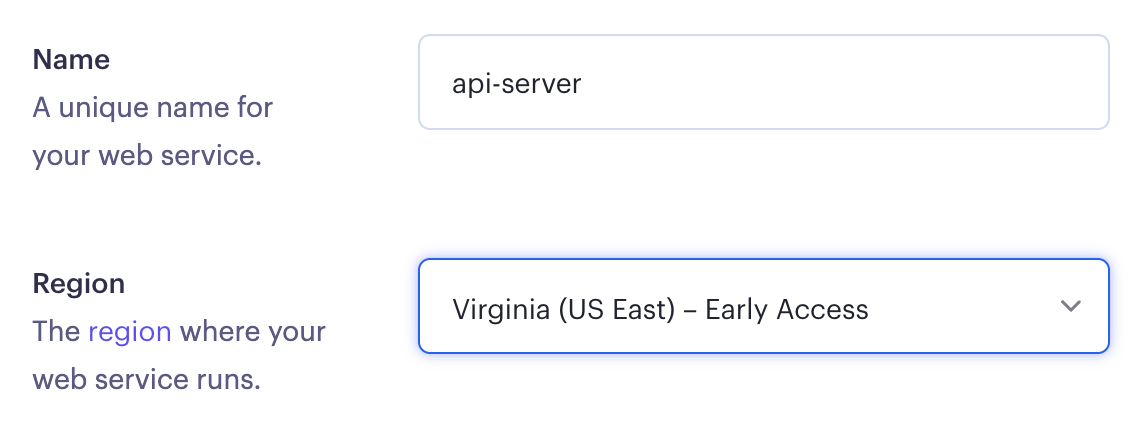
If you're creating your service via a Blueprint, you can instead set region: virginia in your render.yaml file.
Learn more in the documentation.
Enhanced service metrics in the Render Dashboard and API
Powerful new application metrics are available for paid instances in the Render Dashboard:
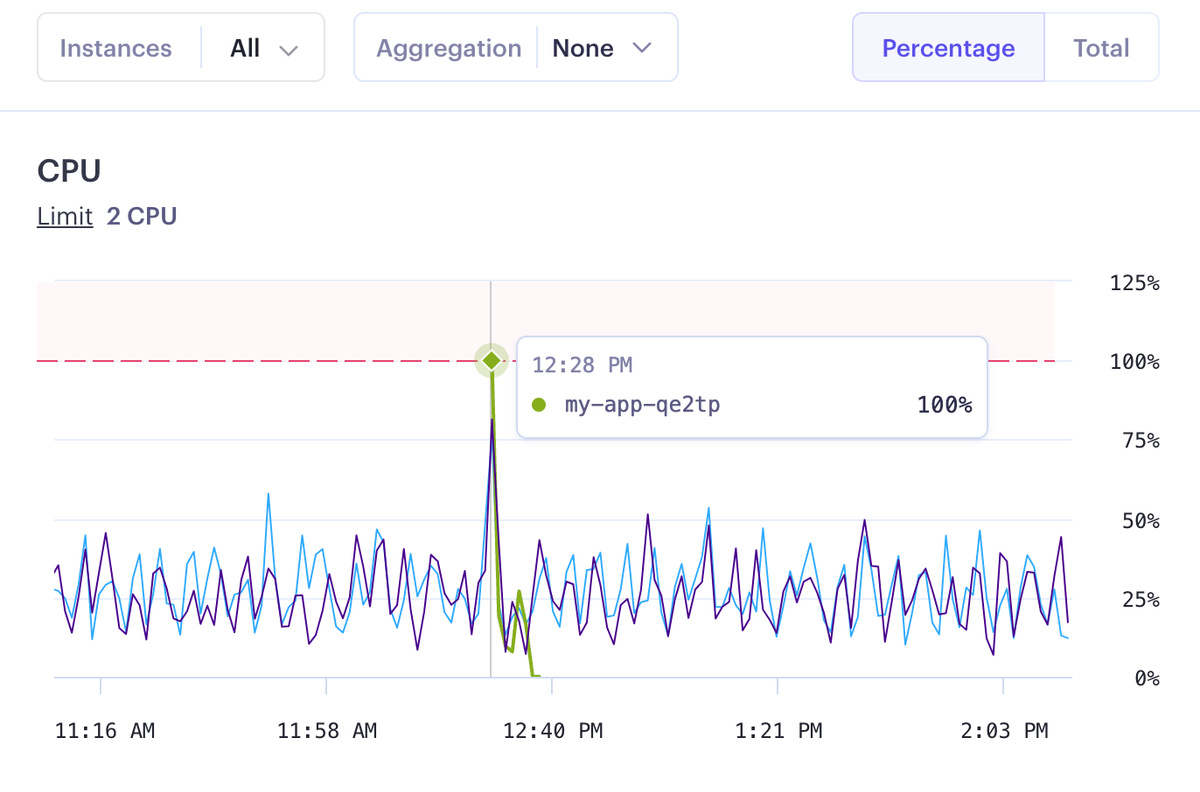
From your service's Metrics page, you can now visualize:
- CPU and memory usage over time, segmented by instance for scaled services
- HTTP request volume and response latency, segmented by status code, path, and more
- Response latency metrics require a team account.
Metrics from the past 7 days are available for individual accounts. Teams can view metrics from the past 14 or 30 days, depending on their plan.
Learn more in the documentation.
IDE validation for render.yaml files
Many popular IDEs now provide schema-backed validation and autocompletion for the render.yaml file format used with Render Blueprints:

To enable in VS Code, install the YAML extension by Red Hat.
Learn more in the documentation.
Added support for Bitbucket
You can now connect your Bitbucket account to Render and deploy from any Bitbucket repo you have access to.
During service creation in the Render Dashboard, click + Connect Bitbucket. After you authorize Render, your Bitbucket repos appear in the selection list:
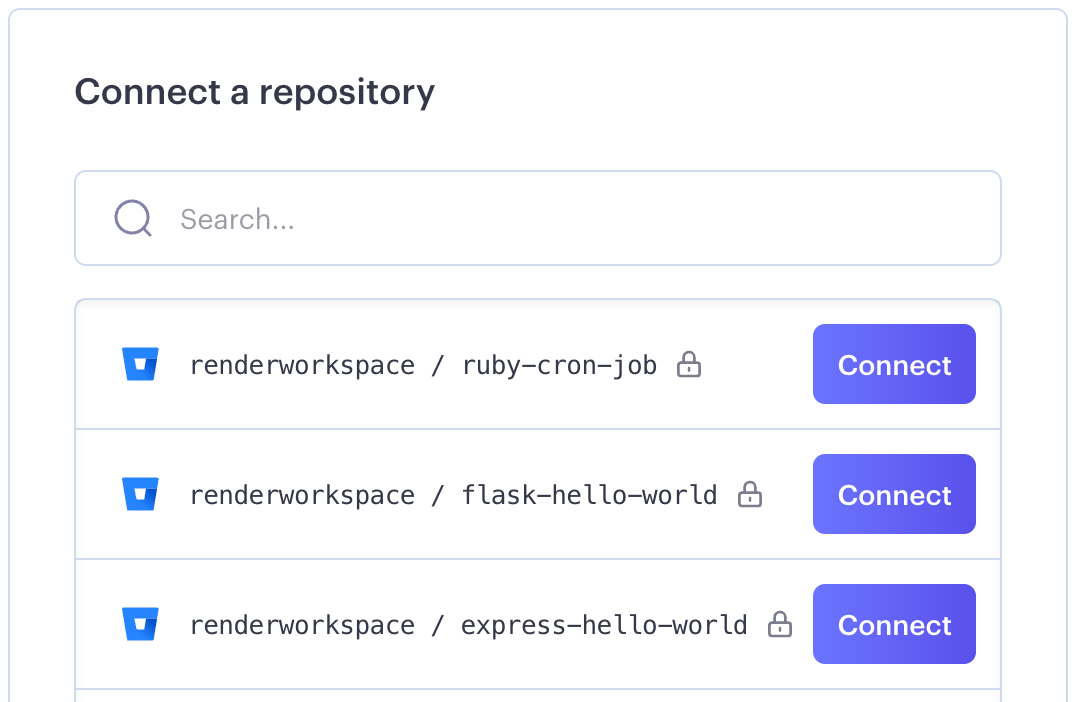
You can also now sign in to Render using your Bitbucket identity.
Learn more in the documentation.
Create a Blueprint from existing services
You can now generate a render.yaml file from your existing services in the Render Dashboard:
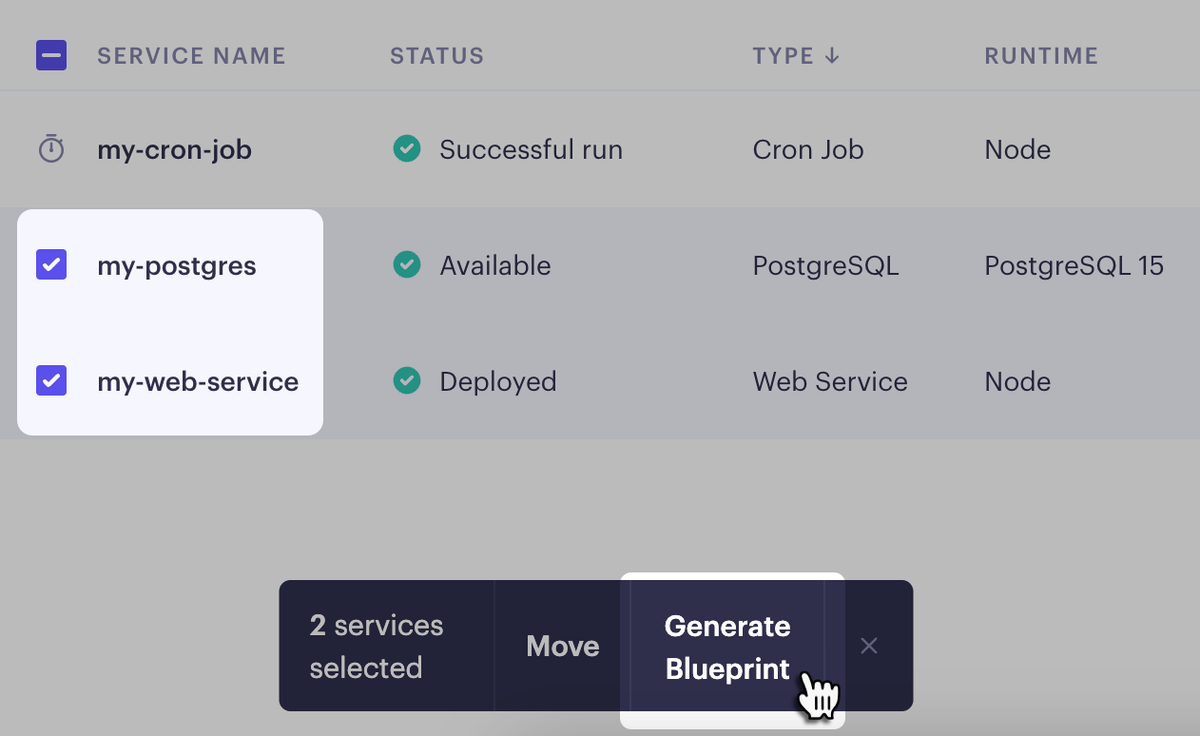
Use this file to create a Render Blueprint that manages those existing services, or to replicate your architecture with a completely new set of services.
Learn more in the documentation.
Designate environments as protected to prevent destructive actions
Teams on Render can now designate individual project environments as protected. Doing so prevents non-Admin team members from performing potentially destructive actions on that environment or its resources, including:
- Deleting any of the environment's resources (services, environment groups, etc.), or deleting the environment itself
- Modifying environment variables or secret files for any service or environment group that belongs to the environment
- Moving resources into or out of the environment
- Modifying access control IPs for any PostgreSQL database or Redis instance that belongs to the environment
- Accessing the shell for a service that belongs to the environment
Learn more in the documentation.
Static site assets now built and persisted in the same region as other services
Render now builds your static sites and persists their assets in the same region where you deployed your first non-static Render service. Previously, all static site assets were stored in the Oregon region.
Static sites are still cached and served to users by a global CDN, regardless of their region. This change primarily improves latency for any rewrite rules that point to a Render web service in the same region.
Added native support for Bun
All Render native runtimes now include the Bun JavaScript toolkit.
You can update your service's build and start commands to use Bun:
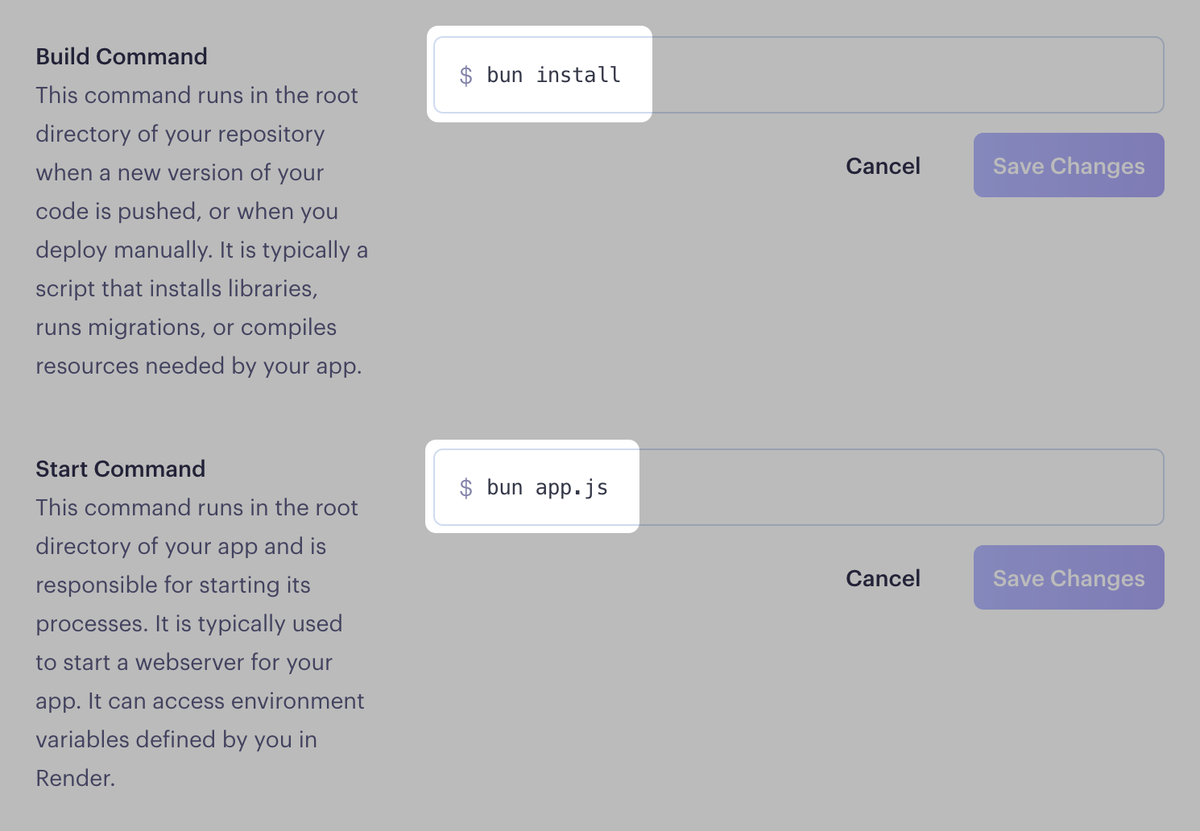
With this initial release, native runtimes use Bun version 1.1.0 by default. You can use a different version by setting the BUN_VERSION environment variable for your service.
Default Ruby version updated to 3.3.0
Newly created Ruby services now use Ruby 3.3.0 by default. You can always specify a different version.
Existing Ruby services keep their original default version to prevent breaking changes.
Added gettext to all native runtimes
All Render native runtimes now include the GNU gettext utilities.
New Redis instances use version 6.2.14
As of 2024-03-11, all newly created Redis instances on Render use Redis version 6.2.14.
Instances created before this date used version 6.2.5. Render will upgrade these instances to 6.2.14 as part of their next scheduled maintenance.
Learn more about Redis on Render in the documentation.
Default Elixir version updated to 1.16.1
Newly created Elixir services now use Elixir 1.16.1 and Erlang/OTP 26.2.2 by default. You can always specify different versions.
Existing Elixir services keep their original default versions to prevent breaking changes.
Default Node.js version updated to 20.11.1
Newly created Node.js services now use Node.js 20.11.1 by default. You can always specify a different version.
Existing Node.js services keep their original default version to prevent breaking changes.
Default Python version updated to 3.11.8
Newly created Python services now use Python 3.11.8 by default. You can always specify a different version.
Existing Python services keep their original default version to prevent breaking changes.
PostgreSQL 16 now available for new Render PostgreSQL databases
Render now supports PostgreSQL version 16 for newly created databases. You select your database's version during the creation flow in the Render Dashboard.
If you have an existing database that you want to move to PostgreSQL 16, see Upgrading your PostgreSQL Version.
Enable high availability for large PostgreSQL databases
Teams with a database on a Pro instance type or higher can enable high availability (HA) for that database from the Render Dashboard.
When you enable HA, Render creates a standby instance of your database and automatically fails over to it if your primary instance encounters an issue.
Learn more in the blog post and documentation.
Add environment variables in bulk from a .env file
You can now bulk-add environment variables from your local .env file while creating or modifying a service or environment group.
Below any environment variable list in the Render Dashboard, click Add from .env:
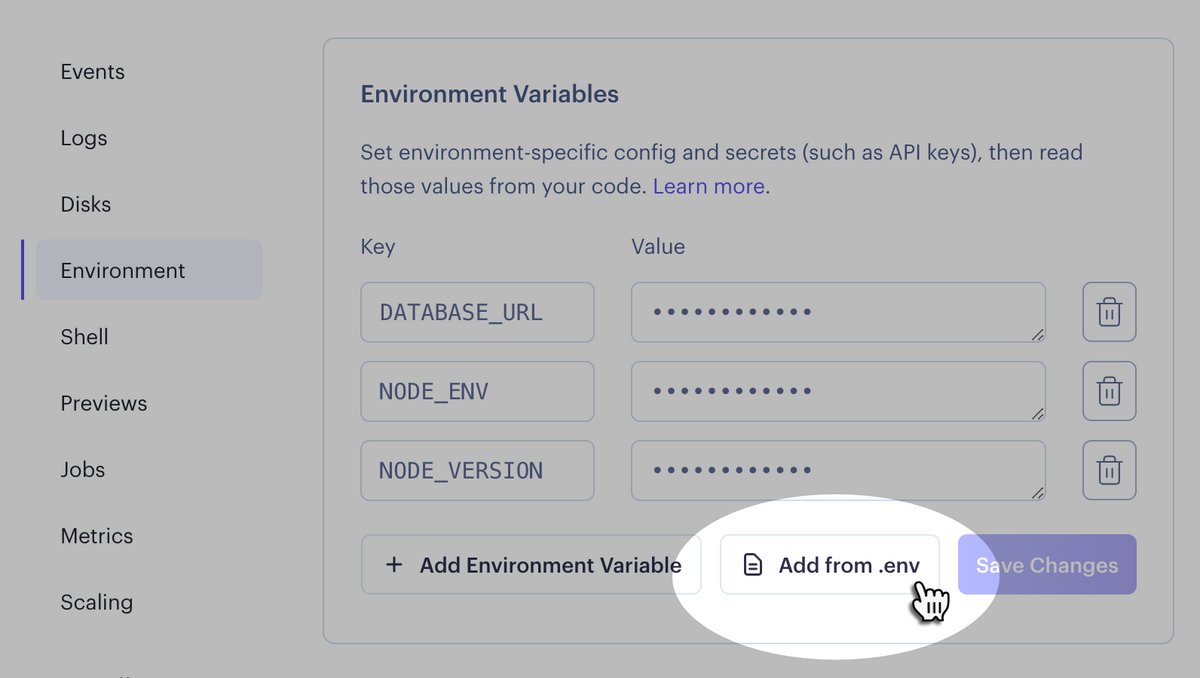
Learn more in the documentation.
Patched Leaky Vessels container breakout vulnerabilities
On January 31, 2024, a set of four container breakout vulnerabilities was disclosed to the public. We have patched all of our affected systems following the recommendations included in the disclosure.
These patches are transparent to applications running on the platform. Render users should see no changes to their experience and do not need to take any corrective actions.
After a thorough audit of potential exploit vectors, we found no evidence that this impacted Render's internal systems or users' apps and data. We will continue to monitor our systems for irregularities or unexpected activity.
If you have any questions, please get in touch with our Support team at support@render.com.
Persistent disks migrated to new hardware
All disks attached to Render services (including PostgreSQL, Redis, and persistent disks for other service types) have been migrated to new hardware. Almost all services will observe improved read/write performance compared to previous hardware (especially for disks under 1 TB in size).
Restrict shared config to a single environment
Teams on Render can now restrict any environment group (a shared collection of environment variables and/or secret files) to a single project environment. This helps protect against accidentally connecting a staging service to a production database (or vice versa).
Learn more in the documentation.
Customize your service notifications
You can now customize:
- Which service events trigger notifications (such as deploy failures)
- Where those notifications go (email and/or Slack)
- Which services you receive notifications for
These settings help you stay informed about exactly the events that you care about most.
To start configuring your notifications, head to your Account Settings or Team Settings page in the Render Dashboard. For all the details, check out the blog post and documentation.
Search your logs with regex and wildcards
We've added support for regex and wildcard search to Render's new log explorer. Try out searches like these:
/(request|response)/- Find lines that mention at least one ofrequestorresponse./api/*- Find lines that mention a path that includes/api/.
See more examples in the documentation.
Updates to default language versions
We've updated the default language versions for several of our native runtimes. Here are the changes:
- Node.js: 14.17.0 → 20.9.0
- Ruby: 2.6.8 → 3.2.2
- Elixir: 1.9.4 → 1.15.6
- Python: 3.7.10 → 3.11.6
A couple items to note:
- These are Render's new default language versions. You can always specify a different version for your app.
- These updates are for newly created services. Existing services keep their original defaults to prevent breaking changes.
New log explorer + HTTP logs
There's a powerful new tool for searching and filtering service logs right from your dashboard:
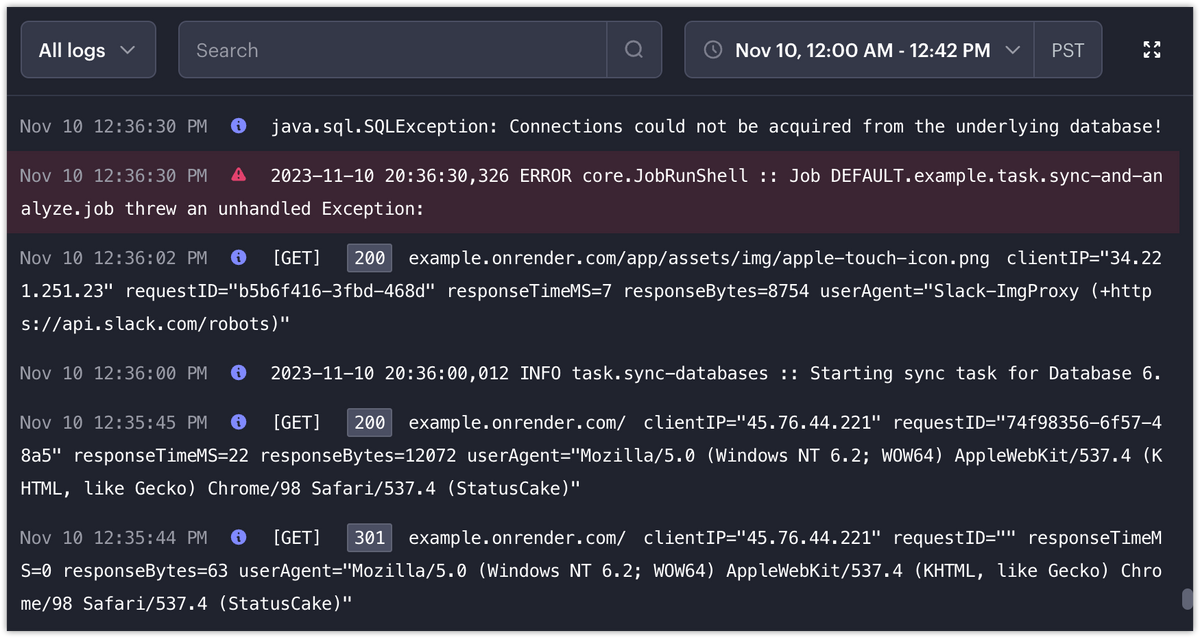
Use the explorer to search your logs for an arbitrary string, filter by log level, and click to view any result in its original context.
With a team account, you can also view logs for every incoming HTTP request to your web services.
See the blog post, or try out the explorer in your dashboard.
Assign access roles to team members
Teams on Render now support two member roles: Admin and Developer. Only Admin members can perform organizational tasks like billing management, enforcement of 2FA, and inviting other team members.
For details, see the documentation.
Run migrations and other tasks with the pre-deploy command
Set a pre-deploy command for your service to run tasks (such as database migrations or asset uploads) right before a new version of your service goes live.
This command is particularly useful for services that deploy a prebuilt Docker image, because they can't fold these kinds of tasks into the build command.
For details, see the blog post and documentation.
Run builds with higher RAM and CPU
Teams on Render can now enable the Performance build pipeline, which runs all of your team's builds on compute with 8x the RAM and CPU of default build instances. If your builds are currently hitting a resource limit, the Performance pipeline provides a whole lot more headroom.
For details, see the blog post and documentation.
Skip an unnecessary pull request preview
Pull request previews help you and your team test out proposed changes, but some pull requests don't have any changes to test (like one that just updates a README).
In these cases, you can now include any of these strings in your pull request's title to tell Render not to generate a preview instance:
- [skip render]
- [skip preview]
- [render skip]
- [preview skip]
Deploy a prebuilt Docker image from a registry
Render can now pull and run a Docker image directly from your container registry. These new image-backed services can speed up your deploys significantly if you're currently building from source with a Dockerfile.
You can pull public images from any registry, along with private images from Docker Hub, GitHub, and GitLab.
For more information, see the blog post and documentation.
Add Datadog monitoring to existing Render PostgreSQL databases
You can now add your Datadog API key to an existing Render PostgreSQL database from the Render Dashboard. (Previously, integrating Datadog with an existing database required contacting Render support.)
View service metrics for different time ranges
While viewing metrics for a web service or private service in the Render Dashboard, you can now choose from multiple time ranges. Zoom in on a hiccup from the last five minutes, observe broader trends from the past week, or go with something in between.
Cancel deploys via Render's REST API
We've added our newest deploy management feature — the option to cancel a deploy — to the REST API. This new endpoint can help if your team uses a third-party CI/CD tool to manage deploys with Render's deploy hooks. Learn more in our docs.
PostgreSQL point-in-time recovery now available
With Point-in-Time Recovery (PITR) enabled for your Postgres database, Render archives your data continuously. If unexpected data loss occurs, you can restore to a new database seeded with data from archives saved before the data loss occurred.
PITR is available on Team, Enterprise, and Organization plans for Pro database instance types and above. Learn more on our blog.
June 30, 2023 - Changelog
We spent the week working hard on upcoming releases, so our update is short and sweet.
Small wins we shipped this week
- Set preferred Poetry version Customers using Python native environments can now use a POETRY_VERSION environment variable to specify the version of Poetry they wish to have installed. Learn more.
- Deploying from external registries We addressed several bugs in the Early Access feature. As a reminder, you can try deploying containers from external registries by enabling the feature in Settings
- Errors for bad start commands If you configure an invalid start command, you'll now see an error in the logs and on the events page

- New logging for slow queries We now log when a query takes longer than 2s so that you have more data to help debug slow app performance.
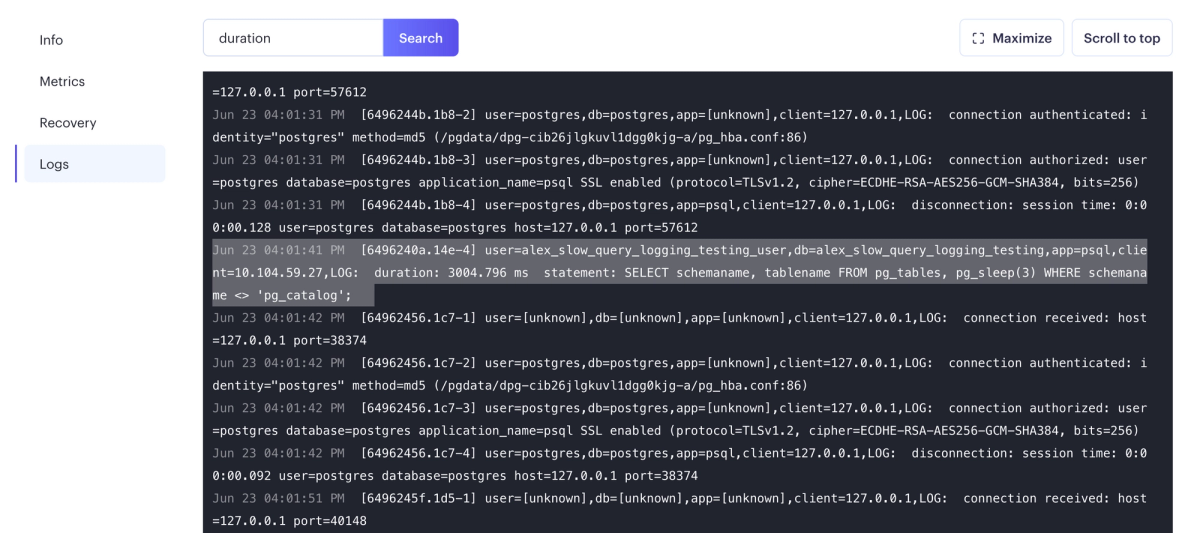
Reminder: Updates to our build retention policy for Instant Rollbacks
Starting on July 5, 2023, we will retain builds only for the most recent deploys of Render services. Based on historical data, this change will not affect most users. The number of builds retained will vary based on plan.
Find more detail under Instant Rollbacks on our pricing page.
Happy long weekend to everyone in America! See you next Friday!
June 21, 2023 - Changelog
We're posting an off-schedule Changelog update to share that Render has achieved a significant milestone. Read on to learn more!
Render's $50 million Series B
This week, we announced that Render raised a $50 million Series B led by Bessemer Venture Partners. This new round of funding empowers us to continue to build toward our vision of making cloud infrastructure management a thing of the past and ushering in a new era of developer productivity.
Learn more about our story on Insider, Techcrunch, and our blog.
Projects are now available for all teams
Projects are now available for all developers on the Team, Organization, and Enterprise plans. You can use projects to organize your app’s services, making managing and collaborating with your team easier.
Learn more on our blog here.
Updates to our build retention policy for Instant Rollbacks
Starting on July 5, 2023, we will retain builds only for the most recent deploys of Render services. Based on historical data, this change will not affect most users. The number of builds retained will vary based on plan.
Find more detail under Instant Rollbacks on our pricing page.
Cancel deploys, Errors for failed on-off jobs, and more
We've also shipped a ton of small wins over the last week.
- Cancel deploys You asked, and we listened. If a deploy was triggered by accident or isn't going as anticipated, click the new Cancel button, and your service will remain as-is
- Show errors for failed one-off jobs Now, if a one-off job fails, we publish a meaningful error that should help make debugging easier
- New Trust Center If you need to request Render's SOC 2 report or learn more about our security and compliance posture, all of this is now available self-serve in our new Trust Center
- Doc updates We added a new section to our Web Services article explaining how host and port configurations work. We also updated the Free Instance Types article to better explain free-tier limitations
That's it for this week! As always, please let us know how we can improve Render for you. Thank you for choosing Render!
June 9, 2023 - Changelog
Happy Friday! This week, we've delivered major improvements to support our platform's reliability and integrity, making things better for everyone building on Render. On to the update!
Improved resilience to DDoS attacks
Render's load balancers are shared by multiple services, helping us handle our rapidly growing scale efficiently. With this update, we're introducing improved domain-level rate limiting to better isolate DDoS attacks. While we also have other DDoS prevention measures in place, this change improves how we prevent attacks from affecting unrelated services.
Bugfix for the native Python environment to allow installation of specific packages like Poetry
One of our customers wrote a script for installing a specific Poetry version on their instance, which uncovered an issue with installing packages that rely on specific locations for shared libraries. We fixed the issue this week, so other developers can try it too! We plan to make the process even easier by supporting a POETRY_VERSION variable similar to PYTHON_VERSION.
Faster, more reliable propagation of changes to custom domains
We are currently rolling out a change to significantly reduce the variance in the time it takes for custom domains to propagate across our global load-balancing infrastructure. The changes bring this variance down to O(seconds) instead of O(minutes). We will finish rolling it out early next week, and it should have the most noticeable impact on our Singapore and Frankfurt regions.
Improved reliability for logs
We finished rolling out an architecture change that removed a big moving part in how we stream logs to customer endpoints. This should lead to even more reliable logging going forward, especially as we continue to scale usage.
We also shipped several automations to block abusive services, making our engineers happier and more productive!
That's it! Have a great weekend!
Jun 2, 2023 - Changelog
Happy Friday! We've shipped fixes for two common pain points this week.
Easily find the runtime version used for apps running on native environments
Sometimes developers who use Render's native environments for building their apps end up using the incorrect runtime version. Since we didn't publish the runtime version, it took time for developers to figure out why their app didn't work. Developers can now see the version of the runtime their app is using and get just-in-time guidance to change it if it's not what their app needs.

Learn more about Native Environments support in our docs here.
Change the credentials associated with a service
Teams often encounter another challenge when someone who sets up a service leaves their team. Since the developer's credentials remain associated with the service, the team can't deploy the service anymore.

Now, team members can change the credentials associated with any service, ensuring that development continues as the team evolves.
Have a great weekend!
May 26, 2023 - Changelog
We have lots of quality-of-life improvements to share this week!
Restart servers using our REST API
Last week, we shipped the ability to restart services without redeploying them. We've now added an API endpoint to do the same — more at https://api-docs.render.com/reference/restart-server.
Faster go-lives for deploys
Massive scale meant some deploys took much longer than we'd have liked to go live. Not anymore! We've rewritten things to make deploy go-lives up to 10x faster.
Improved reliability for PostgreSQL replicas
We've fixed a bizarre edge case where Postgres replicas can get 'stuck' and never catch up with the primary.
Search by service ID
You can now find services using service IDs.
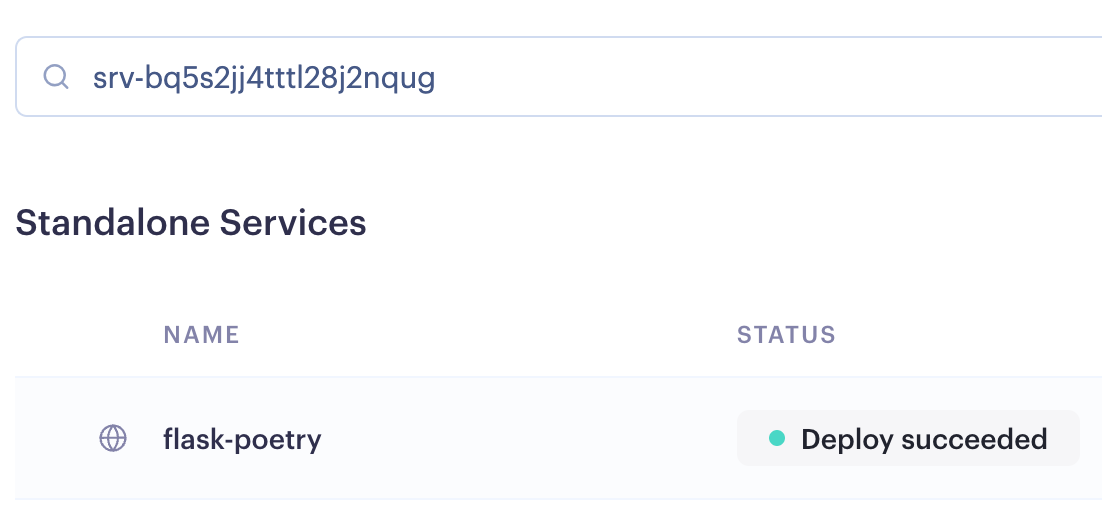
ICYMI
Early Access: Deploy images from public and private registries
Last week, we introduced the ability to deploy container images directly in early access. You no longer need to wrestle with Dockerfiles, and deploys can be much faster using pre-built container images.
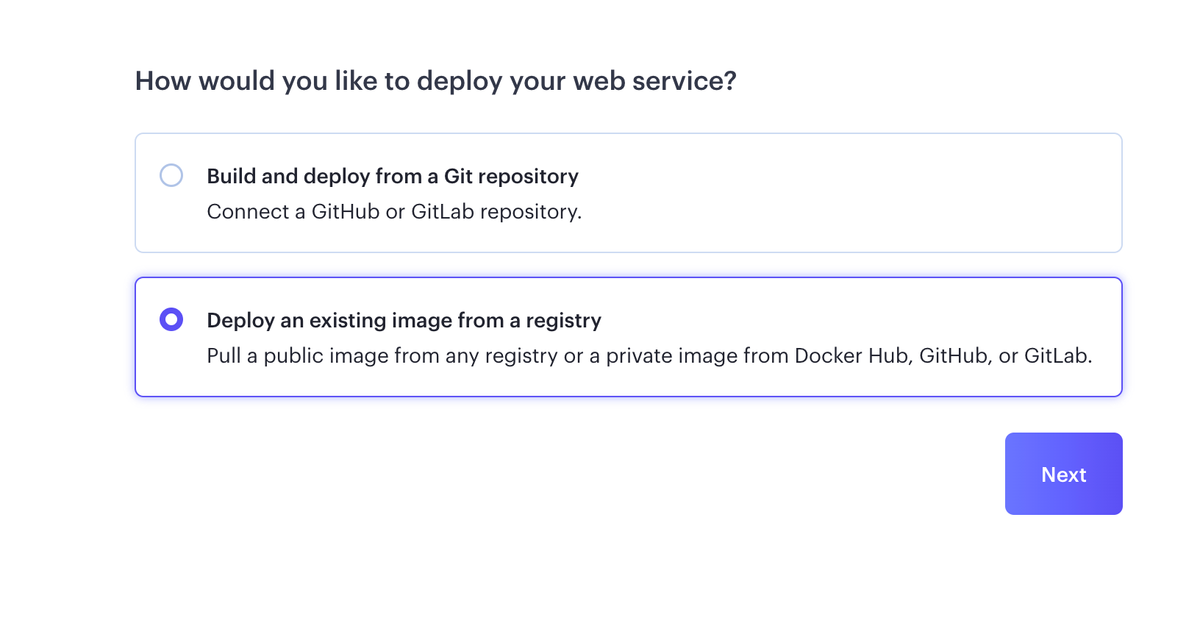
That's it for this week. Have a happy and safe Memorial Day weekend if you're in the US, and enjoy the Spring Bank Holiday in the UK!
May 19, 2023 - Changelog
This week, we're thrilled to share updates on features we know many in our developer community have been looking to see to give developers more flexible options for deploying and operating services on Render. Without further preamble, let's dive in!
New from Render
Now in Early Access: Deploy container images from external registries
Earlier this week, we introduced the option to deploy container images directly on Render. With this capability, you no longer need to wrestle with Dockerfiles and can take advantage of faster deploys.
All developers can deploy images from public registries, and developers on the Teams plan and above can integrate with private registries hosted on GitHub, GitLab, or Docker Hub.

Try deploying your own container image by enabling this feature in Settings.
Platform Improvements
Restart a web service Developers can now restart a web service any time by navigating to the service page in Render and finding the Restart service option in the Deploy menu.
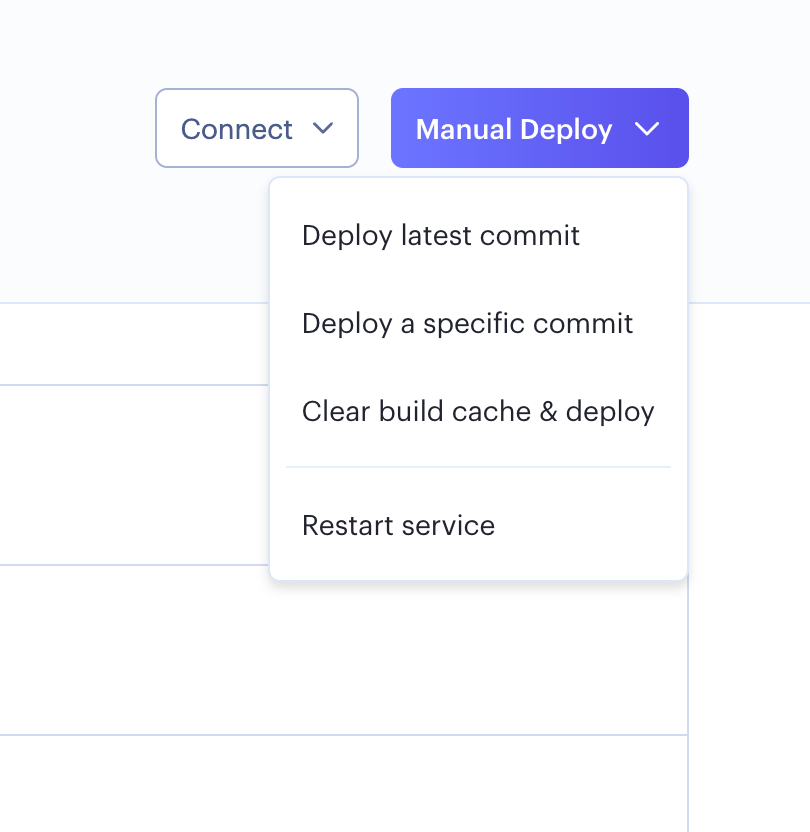
Restart a database replica We've supported restart for databases for a while. However, now, as of this week, developers can also restart database replicas by navigating to database replica settings.
Render now supports 2-3x more websocket connections for a service Render's designed to support developers building nearly any type of app, so we're excited to share that apps using websockets will see improved reliability going forward.
Faster builds on the free tier Our infrastructure team recently completed a significant redesign of our free tier, resulting in increased reliability and faster builds. Under the hood, we replaced a rather complex combination of Knative and Istio with a custom solution in Go that does exactly what we want it to do and no more. We call it the Hibernate stack: it allows us to scale services to and from zero based on traffic and allows free services to share the same build and deploy constructs used by paid services. We'll share more details in a blog post soon.
Have a great weekend!
May 5, 2023 - Changelog
It's Friday, and you know what that means! Time for us to dig into all the work we shipped this week.
New from Render
Host a ChatGPT retrieval plugin on Render We created a Render Example you can use to get started with ChatGPT plugins, all on Render. You'll need early access to plugins to try it out, and you can join the OpenAI waitlist here.
Product updates
- Billing improvements You can now view your invoice immediately after the billing period ends, so you have clarity around your spending on Render all the time.
- External connections to Render Postgres now require TLS v1.2 or higher. You'll also need to use one of the cipher suites listed in our documentation to connect to your databases securely. Learn more here.
ICYMI
Projects in Early Access You can now organize your services by app and deployment to make building and managing services much easier.
Access projects today by navigating to Settings and opting into Early Access. Available on the Team plan and above.
April 28, 2023 - Changelog
Our team is focused on shipping a few new features and bringing our recent Early Access launches into GA, so this week's update is focused on a few critical small wins.
New Releases
Enforced 2FA 🔒 If you're running mission-critical production services on Render, ensuring your Render team is secure is crucial. Starting this week, all Render teams can now require team members to have two-factor authentication enabled on their accounts to access team resources.
Product Updates
Rust is now available in Python environments on Render!
We also shipped several minor bug fixes and updates, including a new label for database pages indicating your database instance's plan.
ICYMI
Projects in Early Access You can now organize your services by app and deployment to make building and managing services much easier.
Get access to projects today by navigating to Settings and opting into Early Access. Available on the Team plan and above.
Get early access to PITR and pgvector If you're still waiting to use point-in-time recovery or pgvector, please get in touch with Support. You'll need to run maintenance on your database to access these features if it was created before March 27, 2023, for PITR, or April 15, 2023, for pgvector.
PITR is available for the Pro plan and above databases on the Team plan or higher.
April 14, 2023 - Changelog
Hi there! We've got a short update for you this week, so we'll keep it brief.
Product Launches
- Projects was released in Early Access this week! You can now organize your services by app and deployment, making developing and managing services in Render more straightforward and delightful. You can get access to the Early Access feature, if you haven't already, in Settings
Feature Improvements
- pgvector is now available for new Postgres databases! pgvector is a Postgres extension allowing you to harness AI to build semantic search into your apps. Over the next couple of months, we'll roll out pgvector to existing databases so that everyone can try it out
Have a good weekend!
April 7, 2023 - Changelog
Hi there! It's the end of a productive week at Render, and we're excited to share this week's updates.
Product Launches
- Point-in-time Recovery is now available in Early Access! You can join the preview by navigating to Settings in the dashboard and finding the Early Access section. New databases on the Pro plan or higher, created after joining the Early Access program, will have the option to use PITR. You will be able to enable PITR for existing databases when the feature is generally available. Learn more here.
Feature Updates
- You can now configure a
previewPlantype for Redis to allow preview environments to use a smaller Redis instance size. - We now remember your last active team and switch to it when you log back into Render.
- We've added links to service or deploy logs in service events to facilitate debugging when errors occur.
- Changes to instance types are now accurately represented in billing. So, if you change an instance type during a billing period, your bill will be easier to follow.
- We added support for Ruby Env versions
3.2.2,3.1.4,3.0.6and2.7.8in native environments.
Bug Fixes
- We made some UI polish improvements throughout the dashboard and billing pages.
March 31, 2023 - Changelog
Rebooting our Changelog
Hi there! As of this week, we're relaunching our Changelog. Expect to see new updates here each week and sometimes in your email.
Here's the update for this week:
New Releases
- You can now change the repo connected to a service
- You can now regenerate the deploy hook URL for a service
Product Updates
- Added support for Python
3.11.2 - Updated log level in log streams to map to appropriate syslog priority. The default log severity level is now
INFOinstead ofALERT - Added support for Sumo Logic as a log stream
- Added support for listing more than 100 branches for GitLab repositories
- Service events now display the user who triggered an instance type change
Bug Fixes
- Fixed the display of y-axis labels in metrics charts
- Added an instructive error message in Blueprint syncs if the repo cannot be accessed
- Clarified in the UI that service health checks are internal
- Started cleaning up Preview Environments when a PR is closed, even if Preview Environments aren't enabled
- Fixed an issue causing external Postgres connections to close unexpectedly
Docs Updates
- Updated the REST API docs to reflect monorepo support
